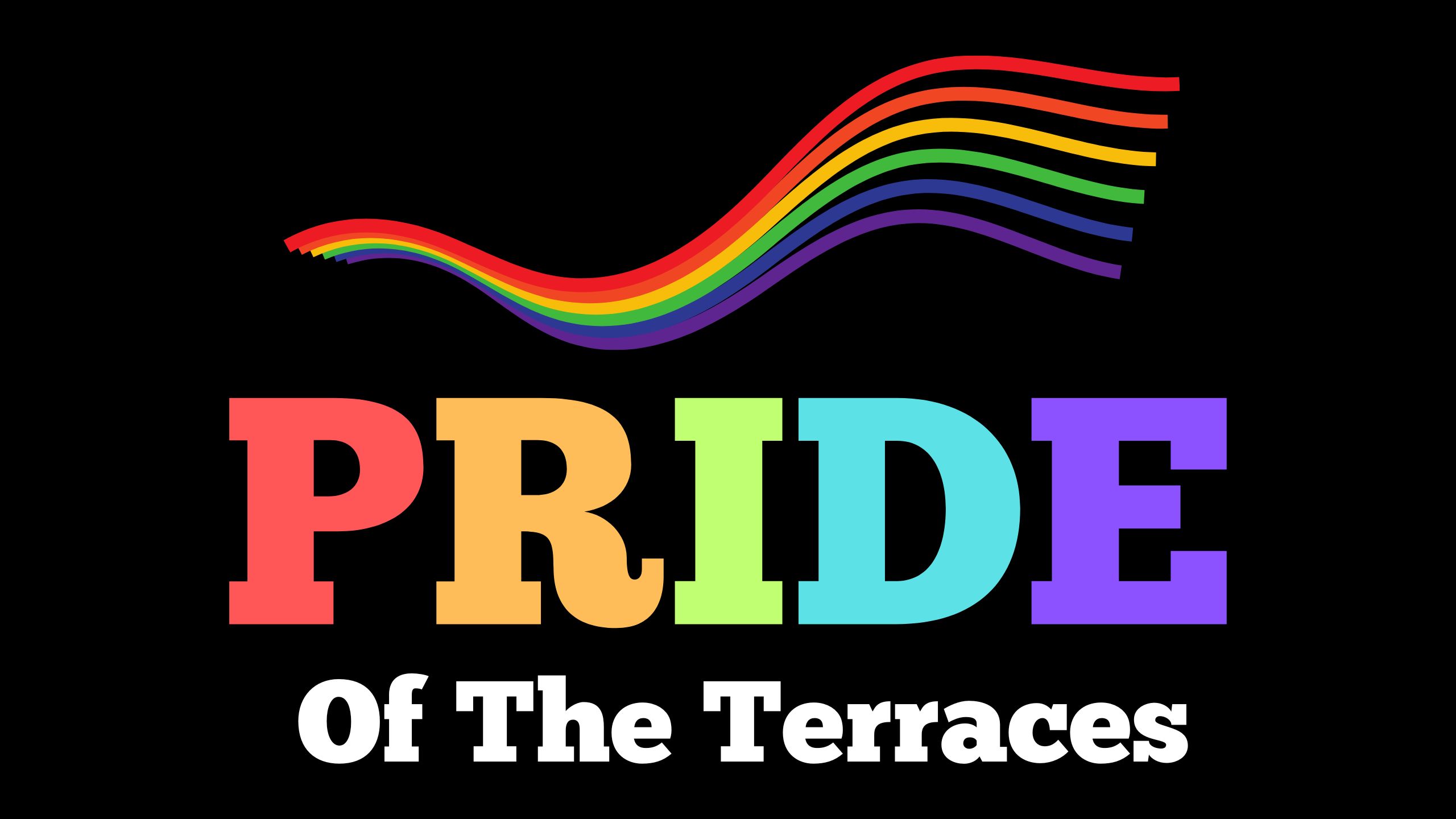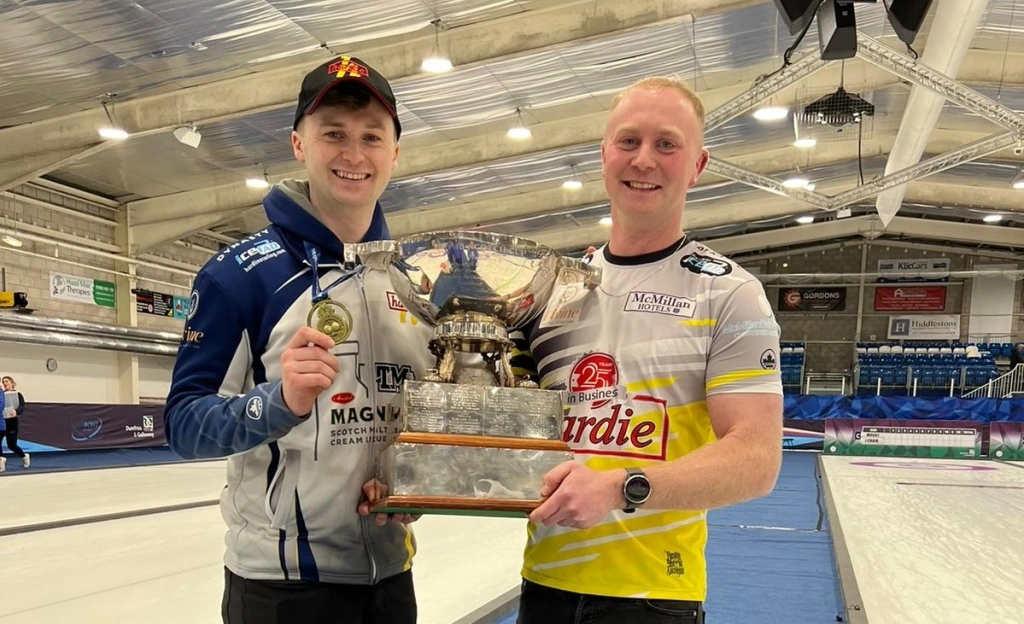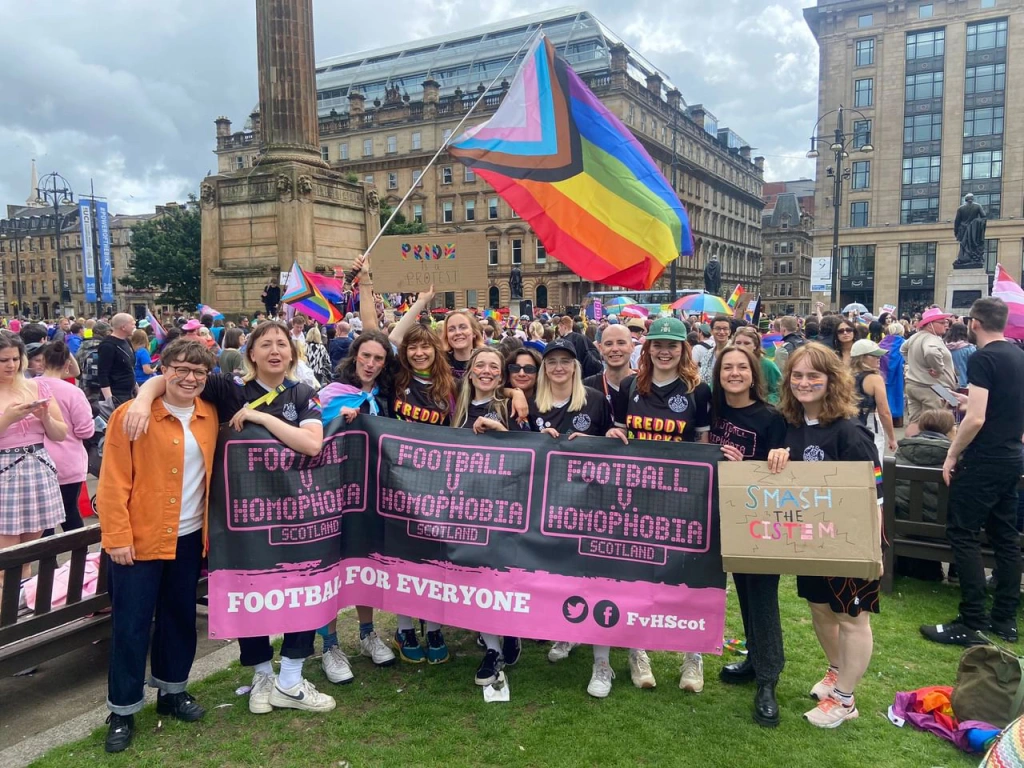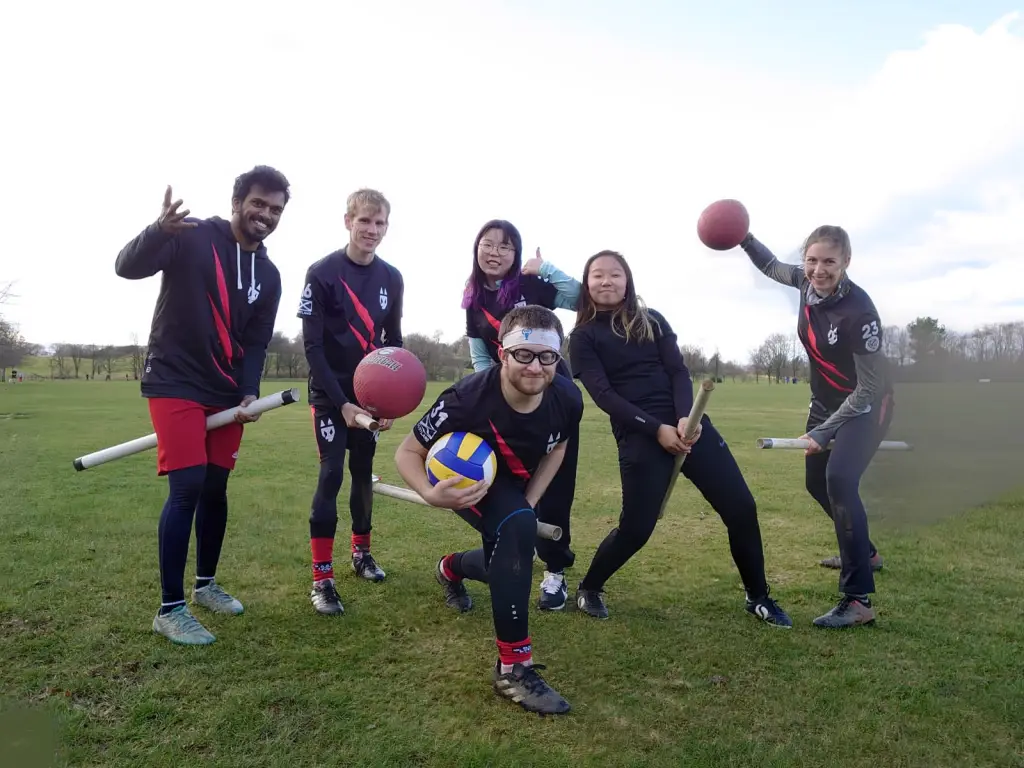Rainbow Laces has given the sporting community – and football in particular – a chance to show their support for LGBT+ people.
The message has by and large been one of acceptance and inclusion, with more high-profile messages and interviews being done by allies than ever before. Throughout the rest of the year, positive reinforcement of LGBT+ participation in men’s football is usually rare, but one place where work is constantly being done to improve the situation is in LGBT+ supporters groups.
Ibrox Pride are one of those groups, forming a little over two years ago after a long consultation with Rangers. Timing brought everything together, as Carole Anderson was invited on to the club’s diversity and inclusion working group around the same time as fans began talking about creating a space for LGBT+ supporters.
Part of the reason that it took some time for Ibrox Pride to launch in November 2018 was that they wanted to be officially recognised by the club, meaning they could have more influence once all the legalities were signed off on, and since then they have tried to be as active as possible.
“It was important to us to have recognition from the club,” Anderson, Ibrox Pride’s chair, explained.
“There are a number of different LGBT+ fans groups in Scotland, and many of them have quite different relationships with their clubs – some are formally recognised, but some are very self-organised.

“For us, it was important to make sure that we were officially recognised by the club, and with that in mind we worked towards getting a memorandum of understanding in place which basically frames how we work together, and the expectations around how we’ll collaborate. We don’t want to be on the outside looking in, we very much want to work together.
“What we wanted to do was position it so that when we were building membership we could give people a degree of trust that we were going to be able to work collaboratively with the club. We also wanted the club to be able to use us as a sounding board.
“There are lots of LGBT+ people who are fans of Rangers scattered across the city and the world, many of whom will have a varied view of what they expect to see happening. For us, it was about trying to channel that in a way where the club could readily consult with us, and that we could work to support the club as opposed to just being critical.
“We’ve hosted events at the bar that was formerly owned by Nacho Novo in Govan, and he himself was there. We had a social event around Rainbow Laces last year, and Mark Hateley – who is a very supportive ambassador of the Everyone Anyone campaign – came along with his family to lend his support that evening. We also got some support from Amy McDonald, the women’s and girls’ manager, when we were able to have face-to-face events.
“Probably the single biggest thing we’ve done would have been around Mardi Gla, we had a massive club presence there from the club itself, the Charity Foundation and Ibrox Pride as well as a number of other folks who joined us.
“There was a photo taken at the end of the march at George Square of us and Proud Huddle, Celtic’s group. I guess that was recognition that football might divide us, but there are common issues around equality that we’re all committed towards.”
Even for Ibrox Pride, whose mission statement is to work for a more accepting environment all year, Rainbow Laces is an occasion for them to rally around for LGBT+ inclusion.
Part of the reason the campaign was created was due to the lack of publicly LGBT+ players in the men’s professional game, but it is just as important for supporters in the stands to feel safe and supported while watching their chosen teams.
Progress has been made in recent years, with increasing coverage of Rainbow Laces both on and off the pitch, but the idea that more can always be done is a cliché for a reason.
Rangers, to their credit, have been very active over the last week or two. They have been posting on social media to support Rainbow Laces and even commissioned specially-made t-shirts in conjunction with their Everyone Anyone campaign that the men’s team trained in ahead of their Rainbow Laces fixture against Ross County last Sunday, and their women’s team warmed up in before taking on Motherwell on the same day.
Other clubs in Scotland, however, have not been so vocal. Most teams put a photo on social media of a player with the laces themselves, but at Ross County for example, there was no sign in the ground on matchday that any campaign was on-going, and that was one of the few matches in the country to have fans in attendance.
That is in stark contrast to England, where even in the lower leagues the likes of League Two clubs Cheltenham Town and Exeter City have regularly produced dedicated content leading up to their designated matches, and rainbow corner flags and even nets have been a feature around the country.
“Rainbow Laces is one that I think Scotland still lags behind in, but it’s an incredibly important part of the football calendar,” Anderson said.
“Everything you see south of the border and the way it is now being embraced in the mainstream where you have commentators on large channels talking about the importance of Rainbow Laces is great, and that gives it tremendous reach.
“It’s a difficult one, because you almost don’t want all of this to hang on the first person to come out. I think we can all imagine what the media flurry around it would be like, so I think what we should do is continue to normalise diversity within sport.
“I draw a lot of comparisons with taking the knee, that has been something which is very widely shared amongst football – and rightly so – but we still have issues, as soon as we bring fans back into ground you have booing.
“I don’t think we should wait for someone to be the person to put themselves forward. It’s about all clubs creating a climate where the players can be supportive, where discussions are had, and know how their club would support them if they were gay, bi or if there was another issue they needed help with.
“It’s about having very obvious, public signposting of clubs’ commitments to diversity and inclusion. Inevitably, we’ll at some point be tested if someone does come out, but I would like to see us putting the groundwork in now – being really clear, and making sure that messaging stands up to scrutiny.
“It’s up to all clubs to make sure they have everything in place. Lots of clubs are also doing lots of work within their own communities, so that needs to continue to happen. Hopefully one day a number of people will feel ok to be openly themselves, but we shouldn’t be waiting for that to happen.
“I thought one of the most powerful things was the bit of social media that Jordan Henderson, the Liverpool captain, did. He quote tweeted a comment from a fan about how important it was to him, the fan had come out at 17, and it shows that they have a tremendous power and reach. When footballers or other sportspeople do show their support through Rainbow Laces, it’s tremendously important for young people who often feel they are excluded from sport.
“It could be that there’s more money to get traction with it in the English game, but I’m not sure – I’m not sure I would argue that the English FA is a lot more progressive than in Scotland. It’s probably a little bit further ahead in some things but you still have situations where Gregg Clarke had to step down because of unfortunate comments.
“There’s still work to be done within the leading bodies on both sides of the border. Sometimes everything just has it’s time – organisations like Show Racism The Red Card are well-established in Scotland, people mark those fixtures for a prominent period of time.
“It doesn’t help that this has been such an abnormal season where we don’t have fans in the grounds. All football clubs are probably feeling the pinch on income, and with Covid it’s difficult to keep the eye on the ball with other things when there are a number of challenging areas. I’d like to hope that by next year, when we’ve hopefully got a degree of normality with fans back in the grounds and clubs in a better position financially, we’ll have more time and space to talk about all of these issues.
“I’m optimistic. Some of the clubs are tremendously creative down south, they have done huge amounts of things, but we have to grow things incrementally. I’m hopeful for next year that we can try and go a bit further.”
Ironically, during the Rainbow Laces match between Rangers and Ross County, there was allegedly a homophobic comment made by one of the County players. The incident was condemned by Rangers boss Steven Gerrard after the match, and Ross County said they would open an investigation, reportedly followed by the Scottish FA.
The reaction of Rangers’ players in the moment was a furious one, with defender Connor Goldson going over to both Gerrard and the fourth official to check if they had heard the comment that was made. Although no results of either the governing body or County’s probe have yet come to light, Anderson believes that is exactly the response you would want if a homophobic comment was made on the pitch.
“We’ll wait and see what the outcome of the compliance officer’s investigation is, and hopefully we’re able to get to the bottom of that,” she reasoned.
“It’s really important that the players do speak up. We didn’t know what was said, the nature of what happened was unclear, but the response was so vehement and outraged, and I think that’s tremendously important. The players themselves were very clear about what was unacceptable, and they were prepared to speak out to make sure that the referee was aware of it.
“Hopefully now a full investigation will take place and we will all be able to learn and move on from that. It’s often very difficult when things have been said or heard for that to become publicly known about, but if something was said that was homophobic then it’s important that it’s dealt with properly and firmly.

“Players have a tremendous role to play in being able to champion respect, champion good behaviours and stand up for others. Allies have a tremendous role to play in just modelling good behaviour, and if that can happen within football grounds and on pitches, and be seen by fans from their manager or the players, that has a huge reach.
“It has much more power than people will give it credit for, seeing people standing up. It’s exactly the same for players who have spoken out about racism, it takes a lot of personal strength to do that – especially when it’s levelled at individual players. It takes strength for them to say ‘it’s not on, I’ll defend my player because this is the right thing to do’. It has a huge reach, and that ripple effect to wider communities is immensely important.
“It gives me real hope actually. As role models, the likes of Steven Gerrard or members of the playing squad have a great opportunity to show some leadership there, so I was very pleased to see them speaking up after the event in that fixture, and I think it’s a sign that there is a real power in the professional game for people to really achieve change.”
That commitment to ensuring that football can be everyone’s game led directly to the creation of Everyone Anyone, a club campaign to work year-round to make the sport a more welcoming place for all – regardless of gender, sexuality, religion, race or any other reason that people may feel excluded.
Through their support for Rainbow Laces, creating Everyone Anyone and supporting other diversity campaigns, Rangers have taken a strong stand – but whenever that happens in football, it inevitably seems to be accompanied by backlash from some on social media.
For a club like Rangers whose history and identity is so often closely associated with relgigion, it would be easy to assume that they face negativity more than others. Anderson has seen progress be made even on that front though.
“One of the biggest tensions we find for supporters is that intersection of faith and sexual orientation,” Anderson said.
“When you think about equalities law, it’s probably the single most likely tension, and whether or not people actually identify with it it’s probably the most likely reason for pushback, people saying it’s against their beliefs.
“It’s an area of challenge. While people are much more accepting that racism is unacceptable, I think there are still people who would be less exercised by homophobic, biphobic or transphobic behaviour than racist behaviour.

“I think that’s just indicative of where society is, we’ve got a while to go before people recognise homophobic behaviour for what it is and stand up against it in the way that they would happily and comfortably stand up against racism.
“For me, and I say this as an LGBT+ person of faith, religious belief doesn’t trump equality for LGBT+ people in the same way that none of our campaigns for equality should disrespect people’s faith. Our experience around Rangers’ diversity and inclusion working group demonstrates that all of that is possible. It’s about having that dialogue and ensuring that none of our behaviours cut across anyone else’s rights.
“What we’re seeing as time goes on is that there is less and less adverse reaction to it compared to the first few times that Rainbow Laces came around. You will always get the odd maverick, but there is much less difficulty when the club puts out posts relating to LGBT+ equality work. Very rarely now do we find we have any negative social media pushback, but what we do see is more and more non-LGBT+ people pulling up inappropriate comments, and that helps make things more difficult to show negativity overtly online.
“I think that’s getting better, we’re certainly aware from the responses to Ibrox Pride’s social media as well as the club’s that there is a lot less negative pushback. Over time that people have accepted that we’re there for a reason, and that we are all part of the Rangers family.
“Everyone Anyone shows that it’s a long-term commitment to change. You don’t change attitudes overnight, you don’t achieve cultural change in a couple of years, it’s a long-term commitment by the club to really try and make a bit of a difference.
“From Ibrox Pride’s point of view, I think it has re-energised people’s relationships with the club. There are quite a number of LGBT+ football fans who retained their allegiance, but they felt that football wasn’t for them. They felt that there wasn’t enough proper signposting within the game, that the football authorities or clubs themselves didn’t take LGBT+ issues seriously, and they probably had fallen a wee bit out of love with the game.
“We are seeing that people are starting to identify more strongly again with the club, and the fact that they now see that Rangers takes it seriously means they can trust that the club is genuinely trying to do things better. That must be better in terms of helping people engage again – whether that’s as an armchair supporter, as a season ticket holder or whether it’s someone who actually wants to continue that in football.
“Once we can build a bit more active work around more events, we can continue to bring people more closely into our work and mature our relationship with the club further. I would like to see that go further, but the obvious thing for us has been that people have fallen back in love with the club because they think they can now trust Rangers to take these things seriously.”





Leave a comment